|
|
|
Sort Order |
|
|
|
Items / Page
|
|
|
|
|
|
|
| Srl | Item |
| 1 |
ID:
141593
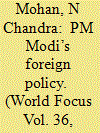

|
|
|
|
|
| Summary/Abstract |
Prime Minister Narendra Modi’s foreign policy has been credited with more achievements than the NDA government’s policies to turnaround the Indian economy. What is so distinctive about his foreign policy? Has he blazed a different trail from his predecessor, Dr Manmohan Singh? Economic diplomacy is a forte they have in common. Both enjoy their foreign travels. During his first year in office, PM Modi visited 17 countries and spent 53 days abroad. This is not very different from Dr Singh’s frequent flyer miles during UPA-11 when he visited 12 countries and spent 47 days outside
|
|
|
|
|
|
|
|
|
|
|
|
|
|
|
|
| 2 |
ID:
141211
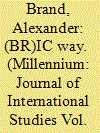

|
|
|
|
|
| Summary/Abstract |
This review article assesses two books against the background of the question of whether China and India as emerging economies provide a development ‘alternative’. The double meaning of this refers to, first, their own experience of recent rapid growth and the chances of replicating this development elsewhere. Second, it points to the external development assistance policies of the BRICs towards the global South and their impact on development thinking and practice.
|
|
|
|
|
|
|
|
|
|
|
|
|
|
|
|
| 3 |
ID:
126247
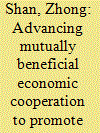

|
|
|
| 4 |
ID:
162808
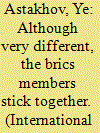

|
|
|
|
|
| Summary/Abstract |
THE RECENT DYNAMICS of world processes has confirmed that unipolar model is unable to cope with the global governance: the current financial institutions, the dollar system that de facto serves the interests of the United States, are gradually exhausting their resources.
|
|
|
|
|
|
|
|
|
|
|
|
|
|
|
|
| 5 |
ID:
111040
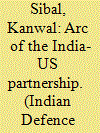

|
|
|
| 6 |
ID:
171454
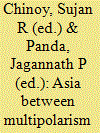

|
|
|
|
|
| Publication |
New Delhi, KW Publishers Pvt Ltd, 2020.
|
| Description |
lii, 587p.: tables, figures, mapshbk
|
| Standard Number |
9789389137439
|
|
|
|
|
|
|
|
|
|
|
|
Copies: C:2/I:0,R:0,Q:0
Circulation
| Accession# | Call# | Current Location | Status | Policy | Location |
| 059863 | 327.5/CHI 059863 | Main | On Shelf | General | |
| 059864 | 327.5/CHI 059864 | Main | On Shelf | General | |
|
|
|
|
| 7 |
ID:
137896
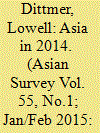

|
|
|
|
|
| Summary/Abstract |
THOUGH SOME MAY HAVE APPROACHED the centenary of the outbreak of World War One with a certain superstitious foreboding, 2014 in Asia was a pretty good year. As Xi Jinping put it in his May 21 address to the CICA (Conference on Interaction and Confidence Building Measures in Asia), ‘‘Asia today, though facing more risks and challenges, is still the most dynamic and promising region in the world.’’1 Economically, Asia remains the fastest growing region, averaging an estimated 6.1% GDP growth for the year, and the forecasting consensus predicts an even better next year. This is an impressive performance in the wake of the global 2009–13 slowdown and particularly the recent cooling of the Chinese locomotive. Politically, the headline for the year is democratic resilience, with relatively honest elections in Afghanistan, India, Bangladesh, Indonesia, and (jumping a few days into 2015) Sri Lanka. As for international security, on the other hand, it was a year of rising tensions: violent terrorist attacks in Afghanistan, Pakistan, Burma/Myanmar, India’s Assam, China’s Xinjiang; continuing confrontations over maritime boundaries in the South and East China Seas; and renewed fighting between India and Pakistan over Kashmir.
|
|
|
|
|
|
|
|
|
|
|
|
|
|
|
|
| 8 |
ID:
135541
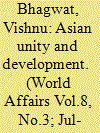

|
|
|
|
|
| Summary/Abstract |
The winding down of colonial empires in the middle of the twentieth century was greeted by a wave of revolutionary and reformist idealism in the newly liberated countries of the third world. many international agencies and movements rose to address the inequalities and injustices inherited from the old system but a reaction from the dominant former imperial powers managed to block or reverse that evolution and establish a subtler neo-colonial exploitative regime through the mechanism of globalization enforced by the petrodollar reserve currency, major banks and multinational corporations. Today various international associations such as ALBA, ASEAN, and BRICS are developing alternatives to the hegemonic Euro-American order.
|
|
|
|
|
|
|
|
|
|
|
|
|
|
|
|
| 9 |
ID:
113249
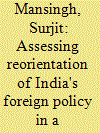

|
|
|
|
|
| Publication |
2010.
|
| Summary/Abstract |
The accelerated pace of globalization in its many facets has benefited some and disadvantaged others. India's foreign policy adjusted well to changes in the external environment by establishing cordial and increasingly substantive relations with the economic dynamos of East Asia, including China, as well as the wealthy countries of the West, especially the United States. Full realization of national objectives is impeded, however, by serious socio-economic problems at home, inadequate staffing or coordination of national security institutions, and the continuing burden of Pakistan's enmity. India's contributions to global management in the years ahead are expected to rise with its capabilities and be welcomed by most other countries as well.
|
|
|
|
|
|
|
|
|
|
|
|
|
|
|
|
| 10 |
ID:
122643
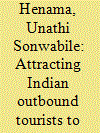

|
|
|
|
|
| Publication |
2013.
|
| Summary/Abstract |
South Africa in the post-1994 era has experienced phenomenal growth in foreign tourism. The Tourism White Paper (1996) had noted that South Africa missed its tourism opportunity because of the country's troubled past. The rapid economic growth experienced by the BRICS countries has changed the face of international tourism. The tourism destinations have moved from developed to developing countries. In this context, the article highlights that South Africa enjoys 2.6 per cent of the lucrative Indian outbound tourism market. This market share has the potential to be increased. India has been added to South African Tourism's (SAT's) Core Markets List. A longitudinal analysis from foreign arrivals indicates two things, one, that India remains the top Asian foreign arrivals country, represented by 71,587 arrivals in 2010, and two, that India remains resilient to hold to its number one spot in Asian foreign arrivals to South Africa. South Africa must gear itself up to encourage the trend.
|
|
|
|
|
|
|
|
|
|
|
|
|
|
|
|
| 11 |
ID:
127531
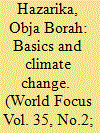

|
|
|
| 12 |
ID:
141950
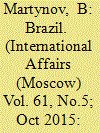

|
|
|
|
|
| Summary/Abstract |
WITH THE DEADLINE of the BRICS Summit in Ufa, Bashkortostan, Russia, drawing near, it is logical to expect heightened interest in Brazil, Russia's strategic partner and its partner in BRICS and the Group of Twenty (G20). Brazil is far away at the other end of the world, yet it shares this country's approaches to major global problems, has nearly equal GDP and several other economic figures, and, no less important, possesses similar national emotional and psychological mindsets.
|
|
|
|
|
|
|
|
|
|
|
|
|
|
|
|
| 13 |
ID:
111758
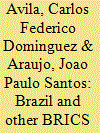

|
|
|
| 14 |
ID:
163904
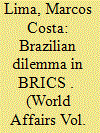

|
|
|
|
|
| Summary/Abstract |
Marcos Costa Lima, Joyce Helena Ferreira Da Silva and Eduardo Oliveira analyse Brazil’s place in BRICS today, considering the drastic change of political direction effected by the government that rose to power after the coup d’état which deposed the legitimately elected administration of President Dilma Rousseff and the subsequent election to the presidency of Jair Bolsonaro.
|
|
|
|
|
|
|
|
|
|
|
|
|
|
|
|
| 15 |
ID:
132471
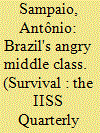

|
|
|
|
|
| Publication |
2014.
|
| Summary/Abstract |
The recent protests show that secure democracy and an absence of extremism are no guarantee of domestic stability.
On 26 May 2014, just a few weeks ahead of the World Cup, an angry crowd surrounded the Brazilian football team in Rio de Janeiro. Striking teachers attacked the team bus as it left the city's international airport, protesting the government's vast expenditure on preparations for the event and neglect of the education system. Heavily armed military police were called in to clear a path for the vehicle, and have followed the players ever since. For many Brazilians, passion for football was supplanted by demands for better infrastructure, salaries and quality of life: the 12 June Brazil-Croatia game that opened the tournament followed a year in which one person was killed and hundreds were estimated to have been injured in demonstrations around the country. This article went to press before the four-week-long competition had finished; football mania was at the time returning to Brazil. The country's mood was likely to be affected by the final result.
|
|
|
|
|
|
|
|
|
|
|
|
|
|
|
|
| 16 |
ID:
130244
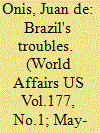

|
|
|
|
|
| Publication |
2014.
|
| Summary/Abstract |
With the extravaganza of the winter Olympic Games in Sochi over, the spotlight now turns to Brazil, the host of the FIFA World Cup championship in June. This tournament, the most widely viewed of global sports spectacles, is held every four years and involves thirty-two national teams, each of which has survived two years of regional competitions in Europe, Africa, Asia, and the Americas to reach the final play-offs. Starting on June 12th, sixty-four games will be played in four weeks, in stadiums all over Brazil, until the winner emerges in a final match on July 13th at the Maracanã, Rio de Janeiro's world-famous arena. Three million foreign fans are expected to visit Brazil, and billions of television viewers worldwide will watch the games. When the World Cup was awarded to Brazil in 2007-part of a remarkable parlay that included the award of the 2016 Summer Olympics to Rio as well-the country's economy was starting to boom as part of the BRIC upsurge that seemed ready to shake up international finance. The event was political from the onset, its significance potentially going well beyond the results on the playing fields where Brazil has won the world championship a record five times, a source of great national pride. But despite initial euphoria over being chosen to host the World Cup, Brazil is now experiencing doubts over whether it can pull off the event and second thoughts about the upsurge of influence on the international scene it was supposed to symbolize. The fervid devotion of Brazilians to soccer has made this country the Land of Football (as well as samba and Carnaval). Some non-Brazilian sports commentators have been baffled, therefore, by protest signs saying, "No to the Cup." But Brazil today is not just a land of football, it is also a land of public protests against corruption, heavy taxes, and deplorable public education and health services, cities with chaotic urban transport, markets with inflated consumer prices, and a dysfunctional political system that is manipulated by an elite for personal benefit.
|
|
|
|
|
|
|
|
|
|
|
|
|
|
|
|
| 17 |
ID:
138053
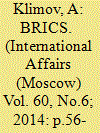

|
|
|
|
|
| Summary/Abstract |
UNTIL RECENTLY, many of those who speak and write about BRICS on a professional level were in a bit of a dilemma. Yes, over the past five years, the meetings of the heads of four (BRIC) and then five states (Brazil, Russia, India, China, and South Africa) seemed to be more like a political "club": a new platform for the discussion of global issues between the leading powers on the Eurasian, South American and African continents. Summit discussions were of an increasingly comprehensive nature, gradually expanding the agenda, but such facts in and of themselves did not as yet mean the formalization of a new association or alliance (although this was exactly what the media often referred to as the BRICS format).
|
|
|
|
|
|
|
|
|
|
|
|
|
|
|
|
| 18 |
ID:
140609
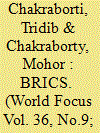

|
|
|
|
|
| Summary/Abstract |
The genesis of BRIC (Brazil-Russia-India-China, predecessor of present-day BRICS) as a multilateral grouping of the four developing or emerging economies can be traced back to September 2006, with the 61st Session of the United Nations General Assembly in New York, in a bid to explore measures of economic and political cooperation among the member-States. Officially, the organization came into existence in 2009, and with the inclusion of South Africa as the fifth member in April 2011, BRIC was re-christened BRICS. Till date, the BRICS member-states have held seven Summits and the latest in Ufa, Russia (July 2015) has been a watershed with the entry into force of the New Development Bank/BRICS Bank and the Contingent Reserves Arrangement. The BRICS Bank is heralded as an alternative to the World Bank-International Monetary Fund-led international economic architecture. However, it remains to be testified whether the BRICS Bank can evolve as a pulsating alternative to the WB-IMF-led financial system, though there is no way denying its establishment as a stepping stone for providing a predominantly South-South economic cooperative mechanism.
|
|
|
|
|
|
|
|
|
|
|
|
|
|
|
|
| 19 |
ID:
140614
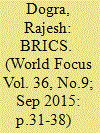

|
|
|
|
|
| Summary/Abstract |
The importance of Brazil, Russia, India, China, and, to some extent, South Africa, within the global governance structure has increased. This rise of importance is derived from the enhancement of the economic capabilities of these powers and the fact that economic interdependence has rendered the world more sensitive to the economic policies of these nations. The global financial crisis, with its detrimental effects on the global economy, was the starting point of a transformation of the global governance landscape. This fluid political and economic global environment seems to be leading to the enhancement of the position of regional powers, especially within the developing world. The more significant fact is that these emerging powers have initiated a process of conducting regular meetings for the purpose of discussing and coordinating their actions related to global issues.
|
|
|
|
|
|
|
|
|
|
|
|
|
|
|
|
| 20 |
ID:
140621
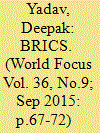

|
|
|
|
|
| Summary/Abstract |
There is no question that this institution will pose as a rival to the Bretton Woods Institutions. The bigger danger for the dollar is the reality that other emerging states that want to break from the conditional ties of the IMF can benefit from the NDB and CRA. The BRICS states make up more than a quarter of the Global GDP and holds less than 11 per cent of the voting rights in the IMF. The United States holds over 16.8 per cent of the voting power in the IMF and along with the countries of Britain, France, Germany and Italy control over 34 per cent of the vote of the IMF. After the crash of Wall Street in 2008 there were efforts by the BRICS group to restructure the World Bank and the IMF to increase the influence of China and other BRICS societies. Wall Street could not countenance this restructuring because the dominance of the Bretton Woods Institutions ensured the military management of the international system in so far as the poorer countries of the world had to keep their reserves in dollars and the US could finance its expenditures from the hard earned savings of other peoples. The BRICS formation will now give the poorer societies a greater say in the international financial order.
|
|
|
|
|
|
|
|
|
|
|
|
|
|
|
|
|
|
|
|
|